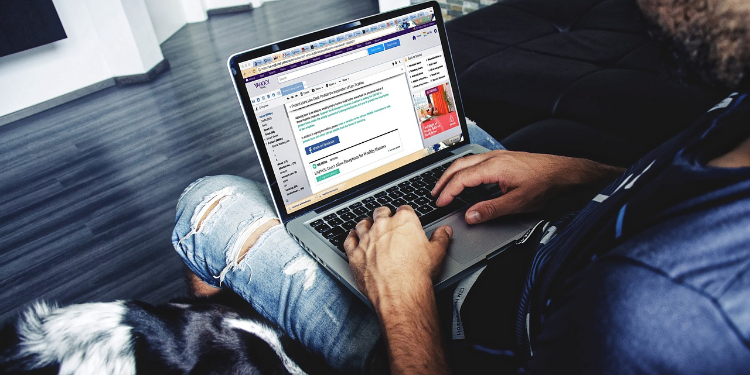
In June last year, the IMF had predicted a 4.9% drop in global growth for 2020 — a percentage that was revised to 4.4% in October. We are in February 2021, and there are no signs of transition to normality before this year’s third and fourth quarters. But innovation and entrepreneurship, accompanied by aspiration, discovery, and evolution are forces that cannot be suppressed until we wipe out Covid-19.
In fact, some of the most successful solutions (e.g. Airbnb, Uber, Slack, Mailchimp), have sprung from ideas that were born at downturn times. Continue reading to find out how you can address the changing landscape in your existing business or start-up, and meet Iraklis Alexopoulos, a Greek expat in Dubai, who saw an opportunity in the ongoing crisis.
How to reinvent your business
For existing businesses, new growth, investment, and innovation may not be a priority, as opposed to security, stabilisation, and continuity. According to McKinsey's latest survey, 75% of business executives aren't concerned with innovation amid the pandemic, while urgent actions such as meeting new customer needs, re-allocating resources, and remaining competitive are matters of greatest importance. In any case, if you want your business to make the cut for the post-crisis era, you need to observe and attune to your customers' new behaviour. No one can tell with certainty how the world will look like when the crisis abates, but you have more chances to remain relevant if you encourage diversity and embrace fresh perspectives.
Start a company amid Covid-19
Starting a company during a crisis means that there are many unprecedented problems waiting to be solved. Hence, you have the opportunity to apply your ideas, skills, and traits on one or more issues and launch a valuable business. With remote working being the new normal, it has never been easier to build a diverse team of experts. Funding or the lack of it may be your rationale for not starting a business now, but it could also be a great excuse to work hard and prove (to some at the beginning, and the world later) that you are a changemaker.
The crisis as a catalyst: Balloon co-founder and expat, Iraklis Alexopoulos, shares his entrepreneurial journey
Iraklis is a Greek expat in Dubai, UAE. He has been living in Dubai for ten years, and before he worked for one year in Berlin, Germany. In his expatriation and professional journey, one thing led to another, and today, he is the co-founder of Balloon, a virtual events platform enabling organisers to create customised and engaging events that they can monetise.
When did you conceive the idea of Balloon?
The idea for Balloon came before Covid-19 was declared a pandemic. In February last year, myself and Balloon's co-founder were following the news and saw that some global events, such as the Mobile World Congress in Barcelona, were being cancelled. So, we put other concepts we wanted to build on hold, and asked ourselves: “why not try to solve this pressing problem?” Physical events are loaded with risk. The pandemic is an extreme situation, but think of bad weather, for example, or the adverse environmental impact of physical events. Balloon came out of voice memos and messages my co-founder and I exchanged while watching the Covid-19 news unfolding. Even though my co-founder and I live in the same city, we rarely met face-to-face — not due to Covid-19 but because remote work has been a common practice for us as a result of the nature of our work. So, in that sense, the lockdown didn't affect us. If anything, the restrictions have been a catalyst for businesses like Balloon, which thrive on remote working.
What made you start Balloon?
The aspiration that this venture is a necessity for the people we serve. In business, we use the painkillers-vitamins analogy. Vitamins are nice to have, but they are the first to cut from your budget, whereas painkillers are must-haves. On a personal level, I didn't start Balloon for the sake of starting a business; it is an internal need to build a product that delivers value and be able to drive its direction.
What is the difference between starting a business outside of a crisis and during a crisis?
For Balloon, this crisis, if anything, has been a catalyst. The pandemic has accelerated the acceptance and adoption of virtual events. A crisis doesn't necessarily have to be global; it can be a personal crisis or market-specific. During any crisis, you are more alert and prudent when it comes to spending time, resources, and effort. At the same time, you may see an opportunity and act on it. I believe it depends vastly on your personality. For me, a crisis entails making sure you mitigate risks and move wisely.
What lessons have you learned from Covid-19?
Remote working, which has been a new thing for many people, is something I am very familiar with due to the nature of my work. However, working from home can be tricky. It is very easy to go on an endless work mode where the lines between work and time for yourself are blurred. I have noticed, but I haven't learned well still the importance of being more diligent and structuring my day as a whole, not just as a professional or entrepreneur.
Seeing an opportunity is different from seizing it. What opportunity did you see and what made you seize it?
The problem that physical events are loaded with risk and can be inefficient was always there. What turned it to an opportunity is the current conditions that have made acceptance of an alternative solution more mainstream. Pre-Covid-19, it would be much more difficult to educate and convince people of the value of virtual events. But with Covid-19 — the biggest global experiment in terms of behavioural pattern changes — people were forced to adopt something different. Never before has been the case that people worldwide are forced to change their ways of working or gathering.
What business challenges have you come across due to Covid-19?
For me, it has been one of the most productive times of my life. I have never felt limited what we can deliver as a team because we can't be in the same room. If anything, I think everyone has been much more productive because of the culture we have as a team. I am a proponent of asynchronous working meaning that not everything has to happen for everyone at the same time. I write long briefs about our vision, what we are building, why we are developing it, and the idea we have, and then leave the floor open for the team to take the initiative. If you work in a synchronous way, which calls for instant exchange of messages, you don't let people have interrupted stretches of time to deliver deep work. Nevertheless, in the beginning, we faced challenges when we had to establish the company. Due to the Covid-19 restrictions in certain public services, some operations that should have happened in a couple of weeks took months.
What personal and professional skills have you wanted to improve upon that could benefit your business?
Everyone comes with a background and speciality, and my expertise is product building and technical expertise. But when you run your own business, you do everything and anything under the sun. There is nothing that is not your job. If you don't do it in the best way, it is your business that will suffer. Running my own business has made me stronger at things I hadn't done before, such as sales. For me, sales is a two-way communication to understand how you can deliver value to the other person. You can't convince someone to want something that they don't need. If you are empathetic and spend time with the other person to understand their pain points, you can find the intersection between your customers' problems and what it is that you offer. Also, I want to build an audience that is not a passive group of people who listen to what I say and applaud. I am talking about a group of people interested in what you have to say, have their own opinions, and are willing to argue with you.
How do you manage risk, and how do you cope with uncertainty; even more so during Covid-19?
There's always the potential of something going wrong. The best thing you can do is educate yourself and know exactly the implications of things not going the way you are hoping for. Have an alternative plan, a best-case scenario, a realistic scenario, and a pessimistic scenario; and rely on data. Having said that, avoid paralysis by analysis because in some cases making a decision is time-sensitive, meaning that you won't have all the time in the world to gather all the information you need. You must prioritise the critical information that you need to be at least able to make a confident decision. The pandemic has shown that things we were taking for granted have been challenged from the ground up. It has made me think in a much more non-traditional way about what could go wrong and has expanded the risk surface, as well as and my approach to a non-deterministic scenario.
What is the mantra that helps you remain resilient during these unprecedented times?
I generally feel uncomfortable feeling comfortable. Even though it can be painful to put myself in situations where I feel challenged, these same situations have helped me grow. So, in times like these, I keep my antennas up for problems, and I challenge the things I take for granted.
What would you tell someone who wants to start a business now? What questions do they have to ask themselves before embarking on this journey?
I am a big fan of asking why questions. If someone wants to start a business, I will ask them why to understand their motivation and objectives. I would argue that if someone wants to start a business for the sake of starting a business, that's not a promising sign. They should feel the urge to start a business for a specific problem they try to solve or an opportunity they have seen, and they are knowledgeable or passionate about. Usually, people hesitate to do anything due to fear of failure or because they are overwhelmed by the amount of work and effort to make it happen. If you are discouraged by the amount of work required, maybe this is not for you because work will only get more. If you are afraid of failure, I would say to think of the worst-case scenario and ways to mitigate the risk. Break your project down to smaller and digestible chunks, so if something goes wrong you will not lose the world. When you compartmentalise things, they become more inviting and less overwhelming. Also, I would invite them to define success. Five years down the line, how does your business look? Where are you? What are you doing? Is success being in the Caribbean sipping piña colada or working with a team you look up to? Finally, I would challenge them to ask themselves if they are ready for the emotional roller coaster that running a business includes.



















